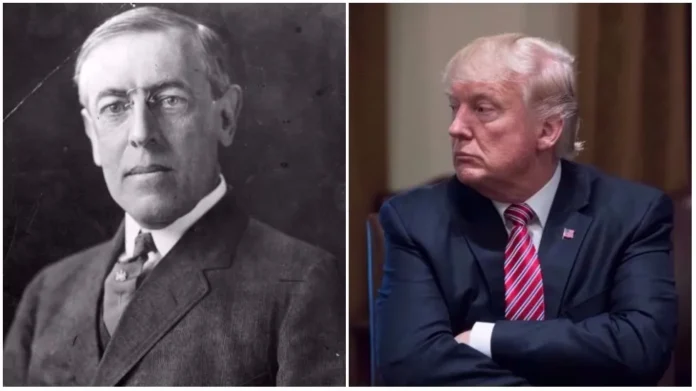Author: Joseph S. Nye, Jr
Affiliation: Harvard Kennedy School
Organization/Publisher: International Affairs
Date/Place: January 01 2019, U.K.
Type of Literature: Journal Article
Number of Pages: 18
Link: https://academic.oup.com/ia/article/95/1/63/5273551
Keywords: The American Exceptionalism, Hegemony, Wilsonianism, Liberalism, and Liberal International Order
Brief:
Nye traces the nature of American foreign policy since President Wilson and the US exit from its international isolation in the late World War I to the current Trump era, focusing on the role played by the president’s personality, and perceptions in defining the general trends of this policy and how this trend has positively or negatively affected the US global hegemony. The author argues that both Wilson and Roosevelt, with their different characters and views regarding world politics, had the biggest influence on US foreign policy, and that all the presidents who came after them were either a replica or distorted copy of one of these two different perspectives. Both Wilson and Roosevelt were moralists, believing in the special mission of Washington and American exceptionalism, but Wilson was an idealist (liberalist), whereas Roosevelt was a realist. Wilson adopted, for example, the issue of universal human rights, and did not hesitate to interfere in Mexico and the Caribbean to promote democracy, as he saw the international order as a liberal one trying to shape a moral foreign policy that made him reject the alliance mechanism and the balance of power, preferring the mechanism of international organizations and collective security. Wilson was “the father” of American soft power, and his intervention in World War I was aimed at bringing perpetual peace without the war ending with anyone’s victory. He wanted, in short, to make global politics more moralistic. On the other hand, Roosevelt was a realist, believing that the United States could save mankind by merging power with the great purposes; he criticized Wilson for his helpless idealism and his lack of awareness in the importance of mechanisms such as the balance of power and alliances in serving American interests. However, Roosevelt was influenced by Wilson, and this became clear in the liberal international order that contributed to its engineering after the Second World War and in which he combined Wilsonian liberalism (economic and financial institutions such as the World Bank) and pragmatic realism of the balance of power (NATO and alliance weaving). The author then questions the fate of the US hegemony and the liberal international order after a hundred years of the Wilsonian era, as both are in a clear retreat. The author sees the Trump era as a symptom but not an essential reason for this retreat, arguing that Trump represents an “anti-Wilsonian moment” in the US’ history, with his “America first” anti-globalization and loathing for the multilateral international institutions. Wilsonianism had, as Nye argues, another strong resurgence opportunity in US foreign policy with the unipolar moment in 1990, but it has deflected and has become an imperialist tendency, threatening the liberal values that it encouraged. This danger culminated with George W. Bush and his team of the neoconservatives, or “neo-Wilsonianism,” as others call them, as they exaggerated the idea of democratic peace to establish democracy by using military force and regime change, exploiting the principle of “responsibility to protect” as they showed during the 2003 invasion of Iraq. In his endeavor to determine the status of American hegemony in the foreseeable future, Nye also discusses the issue of China’s rise and other powers and their impacts, arguing that China will not be able to replace the United States at the top of the international order for many reasons mainly related to US military, economic, and geopolitical superiority. While China’s economy may surpass America’s in total size, it will still lag behind in per capita income; also, the US military spending is four times compared to its Chinese counterpart. On the Soft Power Index, the United States is ranked by the first three countries, while China ranks 26th. Besides, China is the primary beneficiary of the liberal international order built by the US, so it is unlikely to undermine it. As for Russia, it suffers from a sharp demographic decline and heavy dependence on energy exports that prevents it from becoming a rival power like China. Finally, regarding the US hegemony, Nye is more concerned about the threat coming from inside than the threat from abroad, i.e. the rise of nationalism and populism at home, at the expense of liberal values, along with the growing political polarization and dogmatic tendency in foreign policy. Despite all of the foregoing, Nye believes that Wilson’s legacy in developing international institutions and liberal moral values remains a meaningful and important legacy today, and Washington should move towards strengthening its global leadership, instead of imperial hegemony, with the help of this legacy. Otherwise, Wilsonianism now remains suspended, and the future of a US-led liberal international order since 1945 is skeptical.
By: Djallel Khechib, CIGA Senior Research Associate




